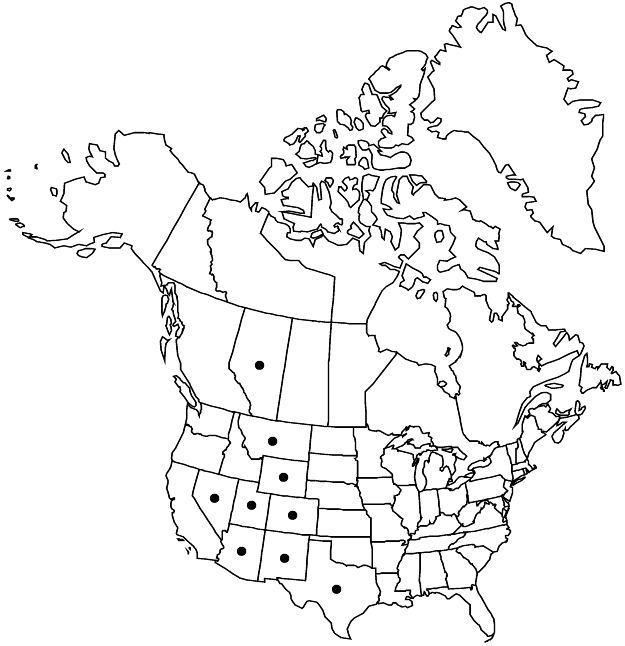Difference between revisions of "Linum australe"
Bull. Torrey Bot. Club 25: 627. 1898.
FNA>Volume Importer |
RevisionBot (talk | contribs) m (Bot: Adding category Revised Since Print) |
||
| (7 intermediate revisions by 3 users not shown) | |||
| Line 20: | Line 20: | ||
-->{{Treatment/Body | -->{{Treatment/Body | ||
| − | |distribution= | + | |distribution=Alta.;Ariz.;Colo.;Mont.;N.Mex.;Nev.;Tex.;Utah;Wyo.;Mexico. |
|discussion=<p>Varieties 2 (2 in the flora).</p><!-- | |discussion=<p>Varieties 2 (2 in the flora).</p><!-- | ||
--><p>The stems of <i>Linum australe</i> are strongly ridged-sulcate to ribbed, especially distally. The corollas are broadly funnelform; petals are yellow to yellow-orange; stamens and styles are yellow; stigmas are bright to olive green. Staminodia in <i>L. australe</i> are short, deltoid, usually two between each pair of stamens, sometimes one or absent. <i>Linum australe</i> is the only species in its range that is glabrous beyond the base and has connate styles. It differs from <i>L. aristatum</i>, which it overlaps in the southern part of the range, in being much more highly branched and having more slender capsules. C. M. Rogers (1984) noted a compact form found in sunny areas from Wyoming northward that warrants more study.</p> | --><p>The stems of <i>Linum australe</i> are strongly ridged-sulcate to ribbed, especially distally. The corollas are broadly funnelform; petals are yellow to yellow-orange; stamens and styles are yellow; stigmas are bright to olive green. Staminodia in <i>L. australe</i> are short, deltoid, usually two between each pair of stamens, sometimes one or absent. <i>Linum australe</i> is the only species in its range that is glabrous beyond the base and has connate styles. It differs from <i>L. aristatum</i>, which it overlaps in the southern part of the range, in being much more highly branched and having more slender capsules. C. M. Rogers (1984) noted a compact form found in sunny areas from Wyoming northward that warrants more study.</p> | ||
| Line 45: | Line 45: | ||
-->{{#Taxon: | -->{{#Taxon: | ||
name=Linum australe | name=Linum australe | ||
| − | |||
|authority=A. Heller | |authority=A. Heller | ||
|rank=species | |rank=species | ||
| Line 52: | Line 51: | ||
|basionyms= | |basionyms= | ||
|family=Linaceae | |family=Linaceae | ||
| − | |distribution= | + | |distribution=Alta.;Ariz.;Colo.;Mont.;N.Mex.;Nev.;Tex.;Utah;Wyo.;Mexico. |
|reference=None | |reference=None | ||
|publication title=Bull. Torrey Bot. Club | |publication title=Bull. Torrey Bot. Club | ||
|publication year=1898 | |publication year=1898 | ||
|special status= | |special status= | ||
| − | |source xml=https:// | + | |source xml=https://bitbucket.org/aafc-mbb/fna-data-curation/src/2e0870ddd59836b60bcf96646a41e87ea5a5943a/coarse_grained_fna_xml/V12/V12_82.xml |
|genus=Linum | |genus=Linum | ||
|section=Linum sect. Linopsis | |section=Linum sect. Linopsis | ||
| Line 63: | Line 62: | ||
}}<!-- | }}<!-- | ||
| − | -->[[Category:Treatment]][[Category:Linum sect. Linopsis]] | + | --> |
| + | |||
| + | [[Category:Treatment]] | ||
| + | [[Category:Linum sect. Linopsis]] | ||
| + | [[Category:Revised Since Print]] | ||
Latest revision as of 18:12, 6 November 2020
Herbs, annual, 10–50 cm, puberulent near base, otherwise glabrous. Stems stiffly ascending-spreading, few to many-branched. Leaves alternate, appressed; stipular glands present at basal nodes or throughout; blade linear, 7–20 × 0.5–l.9 mm, margins entire, not ciliate, apex aristate. Inflorescences racemes. Pedicels 3–15 mm. Flowers: sepals deciduous, lanceolate to narrowly ovate, 4–7 mm, margins scarious, delicately glandular-toothed, apex aristate; petals yellow to yellow-orange throughout, oblanceolate to narrowly obovate, 5–10 mm; stamens (3–)4–7 mm; anthers 0.4–1 mm; staminodia present or absent; styles connate nearly to apex, 2–5.7 mm; stigmas green, capitate. Capsules ovoid, 3.2–4.5 × 2.5–3.4 mm, relatively thick-walled and with characteristic thickened areas at apex in region of true septa, apex obtuse, dehiscing into 5, 2-seeded segments, segments persistent on plant, false septa complete, proximal part membranaceous, not terminating in loose fringe, distal part cartilaginous, margins ciliate. Seeds 2–3 × 0.8–1.3 mm.
Distribution

Alta., Ariz., Colo., Mont., N.Mex., Nev., Tex., Utah, Wyo., Mexico.
Discussion
Varieties 2 (2 in the flora).
The stems of Linum australe are strongly ridged-sulcate to ribbed, especially distally. The corollas are broadly funnelform; petals are yellow to yellow-orange; stamens and styles are yellow; stigmas are bright to olive green. Staminodia in L. australe are short, deltoid, usually two between each pair of stamens, sometimes one or absent. Linum australe is the only species in its range that is glabrous beyond the base and has connate styles. It differs from L. aristatum, which it overlaps in the southern part of the range, in being much more highly branched and having more slender capsules. C. M. Rogers (1984) noted a compact form found in sunny areas from Wyoming northward that warrants more study.
Selected References
None.
Key
| 1 | Stipular glands present only at proximal nodes; stamens (3–)4–5 mm; styles (2–)2.7–3.3(–4) mm. | Linum australe var. australe |
| 1 | Stipular glands present at nodes throughout plant; stamens 5–7 mm; styles 3.6–5.7 mm. | Linum australe var. glandulosum |